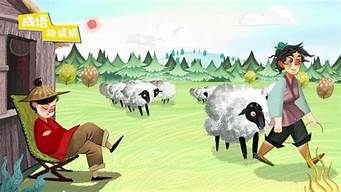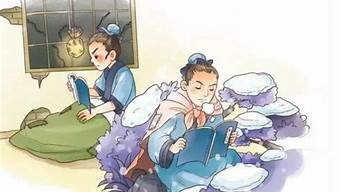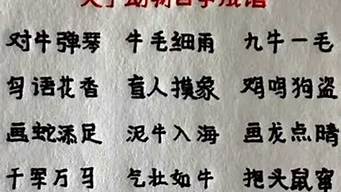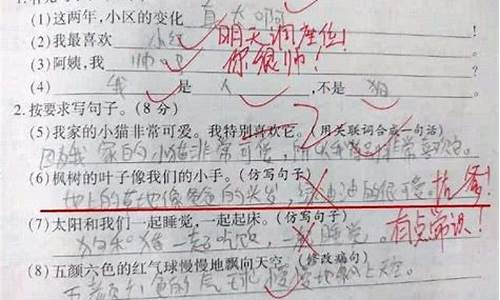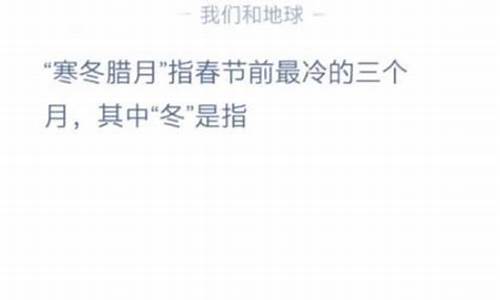bedridden_bedridden派生词
1.你知道伊丽莎白·和罗伯特·的故事吗?
2.曹雪芹英文简介
3.如你叫He Me,你的笔友Sarah 邀请你去参加聚会。请用英文写一封信给Sarca。i
4.英语论文乱世佳人的参考文献
5.暑作业。求《堂吉诃德》的英语梗概(500字以上),读后感(100字以上)及优美英语句子。
6.红楼梦英文介绍

Dear Tom,
Sorry it’s been so long since I last wrote you. I heard from our ex-classmate Sally that you broke your ankle playing basketball. My sympathies on your injury. I remember that you were always very active in school, so I’m not surprised that you still play sports. But I am curious as to how you hurt yourself. Of course, if the memory is too painful, you don’t he to tell me.
Since you will be bedridden for the next few weeks, I thought you might like some books to read. I am sending you copies of two of my forite novels. I hope you enjoy them. Take good care of yourself; don’t try to get out of bed until your ankle is healed! Get well soon.
Your friend,
Dan Wilson
你知道伊丽莎白·和罗伯特·的故事吗?
Poe’s Short Stories Edgar Allan Poe
Analysis of Major Characters
Roderick Usher
As one of the two surviving members of the Usher family in “The Fall of the House of Usher,” Roderick is one of Poe's character doubles, or doppelgangers. Roderick is intellectual and bookish, and his twin sister, Madeline, is ill and bedridden. Roderick's inability to distinguish fantasy from reality resembles his sister's physical weakness. Poe uses these characters to explore the philosophical mystery of the relationship between mind and body. With these twins, Poe imagines what would hen if the connection between mind and body were severed and assigned to separate people. The twin imagery and the incestuous history of the Usher line establish that Roderick is actually inseparable from his sister. Although mind and body are separated, they remain dependent on each other for survival. This interdependence causes a chain reaction when one of the elements suffers a breakdown. Madeline's physical death coincides with the collapse of both Roderick's sanity and the Ushers' mansion.
C. Auguste Dupin
In the stories “The Murders in the Rue Morgue” and “The Purloined Letter,” Poe creates the genre of detective fiction and the original expert sleuth, C. Auguste Dupin. In both “The Murders in the Rue Morgue” and “The Purloined Letter,” Dupin works outside conventional police methods, and he uses his distance from traditional law enforcement to explore new ways of solving crimes. He continually argues that the Paris police exhibit stale and unoriginal methods of analysis. He says that the police are easily distracted by the specific facts of the crime and are unable to provide an objective standpoint from which to investigate. In “The Murders in the Rue Morgue,” the police cannot move beyond the gruesome nature of the double homicide. Because they are so distracted by the mutilated and choked victims, they do not closely inspect the windows of the apartment, which reveal a point of entry and escape. Dupin distances himself from the emotional aspect of the scene's violence. Like a mathematician, he views the crime scene as a site of calculation, and he considers the moves of the murderer as though pitted against him in a chess game.
In “The Purloined Letter,” Dupin solves the theft of the letter by putting himself at risk politically. Whereas the Paris police tread lightly around the actions of Minister D——, an important official, Dupin ignores politics just as he ignores emotion in the gruesome murders of the Rue Morgue. In this story, Dupin reveals his capacity for revenge. When the Minister insulted him in Vienna years before the crime presently in question, Dupin promised to repay the slight. This story demonstrates that Dupin's brilliance is not always dispassionately mathematical. He cunningly analyzes the external facts of the crime, but he is also motivated by his hunger for revenge. Dupin must function as an independent detective because his mode of investigation thrives on intuition and personal cunning, which cannot be institutionalized in a traditional police force.
William Wilson
Poe explores the imagery of doubles in “William Wilson.” William Wilson loses his personal identity when he discovers a classmate who shares not only his full name but also his physical earance and manner of speaking. Poe stresses the external aspects of their similarity less than the narrator's mental turmoil, which is triggered by his encounter with his rivalrous double. When the narrator attempts to murder his double in the story's final moments, he ironically causes his own death. This action demonstrates the bond of dependence between the hated double and the loved self. The -murder- confirms the double as the narrator's alter ego. In other words, the narrator's double exists not as an external character but rather as part of the narrator's imagination. Poe uses the idea of the double to question the narrator's grasp on reality. The -murder- implies that the narrator has imagined the existence of his rival because he suffers from paranoia, a mental state in which the human mind suspects itself to be threatened by external forces that are just imaginary figments of irs own creation.
Lady Ligeia
Many women return from the dead in Poe's stories, and Lady Ligeia is the most alluring of them all. Ligeia's sudden reearance casts dou on the mental stability of her husband, the tale's narrator. Poe does not focus on the narrator's unreliability but instead develops the character of the dark and brilliant Ligeia. Ligeia's dark features contrast with those of the narrator's second wife, the fair-skinned and blonde Lady Rowena. Ligeia does not disear from the story after her arent death. In order to watch over her husband and his cold new bride, Ligeia becomes part of the Gothic architecture of the bridal chamber. Poe symbolically translates Ligeia's dark, haunting physical qualities into the Gothic and grotesque elements of the bedroom, including the eerie gold tapestries that Rowena believes comes alive. Ligeia is not only one of the dead who come alive but also a force that makes physical objects come alive. She uses these forces to doom the narrator's second marriage, and her manifestations in the architecture of the bedroom, whether real or the product of the narrator and his wife's imaginations, testify to the power of past emotions to influence the present and the future.
曹雪芹英文简介
罗伯特·和著名女诗人伊丽莎白·巴莱特的爱情故事,是英国文学史乃至世界文学史上最美的爱情佳话之一。1845年伊丽莎白第一次与罗伯特相见,此前他们已为诗歌神交已久,据说有一段时间两人每天一封信。罗伯特与她见面后,便开始了热烈的追求,丝毫不介意她大他6岁,年已39,且久病在床。在罗伯特的爱与鼓励下,她创造自己的奇迹,她开始离开她蜷缩了多年的屋子,先是被人抱着下楼,接着可以在搀扶下自己下楼了。第二年的春天,在遇见之前在病床上躺了14年的巴莱特可以自己走到大街上了,爱情所创造的生命奇迹终于使她可以回报的执着了。1846年,她不顾父亲的反对,和诗人罗伯特·布朗宁(1812~1889)私奔,在教堂举行简单的婚礼后,各自出发逃往意大利,并在比萨会合,去继续他们的生活。他们成功了。三年后,即1849年,他们已在意大利中部的佛罗伦萨定居。他们大部分时间住在佛罗伦萨,在那里度过了幸福的15年。15年中从不曾有一天分离过,就像他们结婚前从不曾有一天中断过情书一样。1861年6月29日,夫人只是患了轻微的感冒,晚上,她依偎着她的爱人,“用最温存的话表达她对他的爱恋”,直到她在他的胸前睡去。
伊莉莎白·巴莱特·再也没有醒来。
如你叫He Me,你的笔友Sarah 邀请你去参加聚会。请用英文写一封信给Sarca。i
曹雪芹,中国古典名著《红楼梦》作者,出身清代内务府正白旗包衣世家,下面是我给大家整理的曹雪芹英文简介,供大家参阅!
曹雪芹简介Cao Xueqin (about May 17, 1715 - February 12, 1763), the name of dip, the word dream Nguyen, No. snow celery, and the number of celery, celery, Chinese classical "Dream of Red Mansions" author, native of Shenyang (a Said Liaoyang), was born in Nanjing, about 13 years old moved back to Beijing. Cao Xueqin was born in the Qing Dynasty House House is white flag coating family, he is Jiangning weing Cao Yin's Sun, Cao Yong's son (one said Cao Zi son).
Cao Xueqin early years in Nanjing Jiangning weing house witnessed a Jin Yi Wan Ku, rich romantic life. To Yongzheng six years (1728), Cao was guilty of being guilty of a crime, Cao Xueqin moved back to Beijing with his family. And later moved to the western suburbs of Beijing, by selling calligraphy and friends relief for a living Cao Xueqin plain release, hobbies widely, on the stone, poetry and literature, painting, garden, Chinese medicine, weing, technology, diet, etc. he been studied. He persevered in perseverance, after years of hardships, and finally create a very ideological, artistic great works - "Dream of Red Mansions."
曹雪芹人物生平Born giants
Kangxi fifty-four years (1715) the first month, when Jiangning weing Cao Yong in Beijing during the period of death. Kangxi the emperor to the purpose of Cao Yong cousin overlooking the succession to Cao Yin, took Jiangning weing. Is the beginning of March in the seventh day, Cao Cao read off: "sles of the Sao Ma, because pregnant with pregnancy and July." This will be the son of Cao Xueqin, on April 26 (Gregorian calendar May 17, 1715) Weing in Nanjing Jiangning.
Cao Xueqin a few days after the full moon, the third day of June, Cao Cao read the memorial: "This is the day when the rain stacked Pei, four wild Zhanzhe." This is Cao Xueqin name "dip" the opportunity, "Zhan" word to take "The Book of Songs Xiaoya letter Nanshan" "both excellent both Wei, both bare feet, raw my hundred Valley", "World Zhan Huang En" meaning. "Snow celery," the word from the Su Shi "Dongpo eight" of the three: "mud cedar perennial, an inch sigh alone in; snow celery when the move, the spring can do kuai kuai."
Cao Xueqin's grandparents he done Kangxi Emperor's mother, grandfather Cao Yin Kangxi Emperor has been accompanied by reading and the former bodyguard, after Jiangning weing, as part of the two Huai tour salt monitoring censor. In the Kangxi, Yongzheng two dynasties, Cao family and grandchildren three generations of four people ruling Jiangning weing up to fifty-eight years, prominent family, powerful, extremely expensive, became the first giants of Nanjing, the world pushed for the family. Kangxi six under Jiangnan, Cao Yin then drive four times. However, Cao Xueqin a few years later, I did not witness the Kangxi South tour event. "Dream of Red Mansions," the first 16 can be a card, the original written than Jia Baoyu long Xifeng he to listen to Zhao mother and other elders oral to understand that period of history.
Qinhuai dream
(In the Changming Longsheng state), the flowers and bustling (Nanjing), the poems of the Han family (Jiangning weing prefectures), gentleness (Cao) Fugui Township (West Park) to enjoy a Jinyi dandyism, wealthy romantic son of the son of life, the day was satisfied, "every day and sister maidservants only one, or reading, or writing, or playing chess, painting poetry, and even "Lao sprinkle thorns, fighting grass hairpin, whispering quietly, demolition of the word guess", "only in the park in the middle of lying, often willing to charge for the maidservants, actually he to be very busy day." He is all life hy memories of this hy life, in the "Dream of Red Mansions" open book first back to the "author from the cloud" affectionately call "dream".
Childhood Cao Xueqin naughty exception, disgusted eight shares, do not like to read the four books five, anti-imperial examinations, career economy. Although Cao Cao Yan plus discipline, invited the tutor, and on a few days home school, but because of grandmother Lee spoiled, often guarding Xiao Cao Xueqin. Fortunately, Cao family learn deep, grandfather Cao Yin poetry collection in the world, in Yangzhou had control "full Tang" and 20 kinds of hardcover book engred, and control Yangzhou poem. Cao family books very much, there are as many as 3287 kinds of fine. Cao Xueqin lived in such a very beautiful literary and artistic environment, to accept the father and brother education, teacher and friends discipline, reading books, especially love reading poetry, opera, novels such as literary books, such as opera, food, health , Medicine, tea ceremony, weing and other Encyclopedia of cultural knowledge and skills Mo search nothing.
Suzhou weing Li Xu, Hangzhou weing Sun Wencheng and Cao he contact with relatives, Li Xu and concurrently two Huai salt (governance in Yangzhou, Cao Xueqin grandfather Cao Yin Sheng also served as the former). Cao Xueqin childhood trel friends and relatives treled many times in Suzhou, Yangzhou, Hangzhou, Changzhou and other places, on the Jiangnan landscape style love, friends Duncheng, Dun Min poetry that "Qinhuai remnant dream", "Yangzhou old dream."
Home by the desolate
Yongzheng five years (1727), Cao Xueqin thir years old (virtual age), in December, when Jiangning weer Wai Lang's uncle (one said his father) Cao down to harass the Inn, weing deficit, transfer of property and other crimes were dismissed imprisonment, The first lunar month before the Lantern Festival was copied (family size men and women and servants 114). Cao Xueqin moved back to Beijing with the family. Cao from the depressed, increasingly declining. Just back to Beijing, there are Chongwen door garlic mouth old house house 17 and a half, three servants, chat to date. But in order to repay the harassment station case owed silver, and to fill the family, forced to sell acres of acres of money, a sle to take advantage of this, and Dongzhuang tax also named to borrow some. And then later, a day off like a day, inevitably cast room to sell, more thieves Kou burglary, as well as even the daily money are not, was forced to take the house book out of the mortgage. Eventually reduced to the portal dying, the population scattered, more than a few years more than rubble. Cao Xueqin for the family thing is not good, more and more made no words, "Although not dare to say eloquent, but the way of human feelings, slightly better comprehend better."
Celebrity celebrities
Yongzheng end of the year, Cao Xueqin year long like a year, began to provoke the burden of the family, and gradually be able to help Cao Caizhe some housework. Because Cao overlooking the staff at home, lazy in the entertainment, Cao Xueqin came out on behalf of the reception, met a number of political celebrities and literary predecessors, under their influence set up a book that Lide speech lofty ambition, Infatuation gradually out of some, in order to revive the family and work hard, once diligent study, visiting the family looking for friends, multi -
Humen morning sunset
Qianlong first year (1736), Cao Xueqin twenty-two years old, encyclical to oid Cao empty.
Qianlong early years, Cao Xueqin served as secretary of the House of Postscript, and later into the Xidan stone tiger alley right wing (formerly known as "Humen") as a humble little position. Cao Xueqin in the religion of the specific work, there are teaching, teachers, husband, husband, husband, when poor and so on. Cao Xueqin Beijing friends circle Wang Sun son, such as Duncheng, Dunmin, Fu Peng and others. In their contacts with them, Cao Xueqin to enjoy the Beijing culture.
Qianlong nine years (1744), Cao Xueqin thirty years old. Dun Cheng (1734-1791) eleven years old, Dunmin (1729-1796) 16 years old, into the school. The brothers are very admired Cao Xueqin talent style, reciate his uninhibited character and open mind. In the long winter night, they sat together, listening to Cao Xueqin witty and humorous, arrogant "male ask", often by Cao Xueqin's "strange talk", "eloquent" attracted, impressed. "In the morning sunset, the West window cut the candle faint." Record and deeply memorable this memorable day.
Cao Xueqin about the writing of the "Dream of Red Mansions" in the first draft of the draft "Feng Yue Bao Jian."
Yan City song
Qianlong twelve years (1747), Cao Xueqin thirty-three years old, about the year moved to the western suburbs of Beijing. After a few years living in Beijing Xidan Puna Street, Chongwen outside the door of the Buddha Temple, Fragrant Hill is the white flag of the four wang and ce village, inlaid yellow flag camp north slope, white house Tuan (Xizhimen about 50 miles). During this period, Cao Xueqin live grass ham, enjoy wild flowers, live to find poetry, brush, and singing, selling paintings, buy drunk, crazy songs, recollections, the book of seclusion life, a taste of Beijing well culture, side by selling calligraphy and fu Peng, Honest, Dun Min, Zhang Yiquan and other relatives and friends of the relief for a living, frankly "donated Cao Qin" poem: "full of basil is not old, the family eat porridge wine often credit." Cao Xueqin long hate half down, nothing Poverty and fall in the situation, I feel very sad depression, it can not help but sarcastic, self-seeking to send ", the correct and evil of the true feelings of more and more clear.
Written yellow lees
Cao Xueqin "fill the days" of the blog never slack, until the old age, friends Duncheng "send Huo Xueqin (dip)" is still comfort him: "to persuade Jun Mo Moqin diners, advised Jun Mo Mo Fu door. There is a German color, as the book yellow lees village. "Means that the identity of the criminals after the identity and other reasons, Cao Xueqin's personal struggle encountered difficulties and obstacles, Tan advised him to quit, concentrate on the book. Cao Xueqin also live up to expectations, in the seclusion of the Western Hills of more than 10 years, with perseverance perseverance, the old "Fengyue Baojiao" "Phi read ten years, add five times", written as a masterpiece "Dream of Red Mansions."
Re-visit the hometown
Qianlong twenty-four years (1759), Cao Xueqin forty-five years old, about the south tour Jiangning. South reason for the unknown, may be to visit the discrete tribe, may also be other household chores (pass Cao Xueqin at this time before and after the two river governor Yin Jishan's staff). During the south tour, experience mountains and rivers, pay tribute to the old track, obedient to the past. Zhang Yiquan "Huai Cao Qin Creek" a poem as in this period.
Qianlong twenty-five years (1760), Cao Xueqin forty-six years old, early autumn, Dunmin's poem "closed-door nostalgia feeling" cloud: "so pay a different years, the past re-mention the dream!" May refer to Cao Xueqin South trel, the years did not return. The southern tour lasted more than a year, before and after the Chung Yeung Festival back to Beijing. Shortly after the holiday, Dunmin in the friend Minglin domestic animal husbandry encounter Cao Xueqin, do "sense of growth sentence" to remember.
Died of illness
Cao Xueqin return to Beijing after the South, still continue to write "Dream of Red Mansions." Qianlong twenty-seven years (noon 1762), Cao Xueqin forty-eight years old, due to premature death, suffering from excessive sadness and grief, bedridden, about this year's New Year's Eve died in Beijing. Dun Cheng as "to pull Cao Xueqin", Dunmin for "river dry set drink wall and hanging snow celery", Zhang Yiquan as "injury celery Creek lay".
英语论文乱世佳人的参考文献
Dear Sarah,
Thank you very much for inviting me to your party. But I am sorry to inform you that I will not be able to attend. My mother is sick and will be bedridden for several days. I am obliged to take care of her.
I love the beautiful postcard that you send me. I will place it on top of my desk.
Please give my wishes to your family.
Sincerely,
(你的名字)
暑作业。求《堂吉诃德》的英语梗概(500字以上),读后感(100字以上)及优美英语句子。
《飘》(Gone With The Wind)是一部出版于1936年的美国,作者为玛格丽特·米契尔,在1937年获得普利兹奖。这本是其作者活着时出版的唯一一部作品,但它成了美国史上最为畅销的之一
Margaret Munnerlyn Mitchell (November 8, 1900 – August 16, 1949) was an American author, who won the Pulitzer Prize in 1937 for her novel Gone with the Wind. The novel is one of the most popular books of all time, selling more than 30 million copies (see list of best-selling books). An American film adaptation, released in 1939, became the highest-grossing film in the history of Hollywood, and received a record-breaking ten Academy Awards. She has been honored by the United States Postal Service with a 1¢ Great Americans series postage stamp.
Early life
Margaret Mitchell was born in Atlanta, Georgia to Eugene Mitchell, a lawyer, and Mary Isabelle, much referred to as Maybell, a suffragist of Irish Catholic origin. Mitchell's brother, Stephens, was four years her senior. Her childhood was spent in the laps of Civil War veterans and of her maternal relatives, who had lived through the Civil War.[citation needed]
After graduating from Washington Seminary (now The Westminster Schools), she attended Smith College, but withdrew during her freshman year in 1918. She returned to Atlanta to take over the household after her mother's death earlier that year from the great Spanish flu pandemic of 1918.
Shortly afterward, she defied the conventions of her class and times by taking a job at the Atlanta Journal. Under the name Peggy Mitchell she wrote a weekly column for the newspaper's Sunday edition, thereby making her mark as one of the first female columnists at the South's largest newspaper. Mitchell's first professional writing assignment was an interview with an Atlanta socialite, whose couture-buying trip to Italy was interrupted by the Fascist takeover.[citation needed]
Mitchell married Berrien “Red” Upshaw in 1922, but they were divorced after it was revealed that he was a bootlegger and an abusive alcoholic. She later married Upshaw's friend, John Marsh, on July 4, 1925; Marsh had been best man at her first wedding and legend has it that both men courted Mitchell in 1921 and 1922, but Upshaw proposed first.[citation needed]
She is also the distant cousin to famous gunfighter/dentist, Doc Holliday, who participated in the Gunfight at the O.K. Corral. It is also thought that she modeled Ashley Wilkes, a main character in Gone with the Wind, after Holliday.
Occupation
Using Mitchell's scrapbooks from the Hargrett Rare Book and Manuscript Library at the University of Georgia, editor Patrick Allen collected 64 of the columns Mitchell considered her best work. They were published in 2000 under the title Margaret Mitchell, Reporter.[1]
Her portraits and personality sketches in particular show a promise of her skill to portray the kind of characters who made Gone With the Wind the second best-selling book, next to the Bible, at the time of publication.[dubious – discuss][2] Even as a supposedly neutral reporter, her irrepressible personality shines through. This collection of Mitchell's journalism transcends fact-gathering, showing Mitchell as a young woman and providing a compelling snapshot of life in the Jazz Age South.
Writing Gone with the Wind
Mitchell is reported to he begun writing bedridden with a broken ankle. The house where Mitchell lived while writing her manuscript is known today as The Margaret Mitchell House and located in Midtown Atlanta. A museum dedicated to Gone with the Wind lies a few miles north of Atlanta, in Marietta, Georgia. It is called "Scarlett On the Square", as it is located on the historic Marietta Square. It houses costumes from the film, screenplays, and many artifacts from Gone With the Wind including Mitchell's collection of foreign editions of her book. The house and the museum are major tourist destinations
Publication
Mitchell lived as a modest Atlanta newspaperwoman until a visit from Macmillan editor Harold Latham, who visited Atlanta in 1935.[3] Latham was scouring the South for promising writers, and Mitchell agreed to escort him around Atlanta at the request of her friend, Lois Cole, who worked for Latham. Latham was enchanted with Mitchell, and asked her if she had ever written a book. Mitchell demurred. "Well, if you ever do write a book, please show it to me first!" Latham implored. Later that day, a friend of Mitchell, hing heard this conversation, laughed. "Imagine, anyone as silly as Peggy writing a book!" she said. Mitchell stewed over this comment, went home, and found most of the old, crumbling envelopes containing her disjointed manuscript. She arrived at The Georgian Terrace Hotel, just as Latham prepared to depart Atlanta. "Here," she said, "take this before I change my mind!"[citation needed]
Latham bought an extra suitcase to accommodate the giant manuscript. When Mitchell arrived home, she was horrified over her impetuous act, and sent a telegram to Latham: "He changed my mind. Send manuscript back."[citation needed] But Latham had read enough of the manuscript to realize it would be a blockbuster. He wrote to her of his thoughts about its potential success. MacMillan soon sent her a check in advance to encourage her to complete the novel — she had not composed a first chapter. She completed her work in March 1936.
Herschel Brickell, a famous literary critic for the New York Evening Post, reviewed Mitchell's book in an article titled " “Margaret Mitchell’s First Novel, ‘Gone With the Wind,’ a Fine Panorama of the Civil War Period.” His review helped launch Mitchell's career by calling attention to what would become one of the best novels of the Southern Renaissance. Over time, Brickell and Mitchell became extremely close; much of their correspondence has been published and is ailable in the archives at the University of Mississippi. Brickell was also a correspondent, friend, and adviser to other southern writers including Eudora Welty, Truman Capote, William Alexander Percy, Marjorie Kinnan Rawlings, Zora Neale Hurston, Stark Young and Allen Tate.[4]
Gone With the Wind was published on June 30, 1936. The book was dramatized by Did O. Selznick, and released three years later. The premiere of the film was held in Atlanta on December 15, 1939.
Gone with the Wind was such an overnight success that its publisher George Platt Brett, President of Macmillan Publishing, ge all its employees an 18% in 1936.
Death
Mitchell was struck by a speeding automobile as she crossed Peachtree Street at 13th Street with her husband, John Marsh, on her way to see the British film A Canterbury Tale at The Peachtree Art Theatre in August 1949. She died at Grady Hospital five days later without regaining consciousness. The driver, Hugh Gritt, was an off-duty taxi driver. He was driving his personal vehicle at the time, but his occupation led to many erroneous references over the years to Mitchell’s hing been struck by a taxi. After the accident, Gritt was arrested for drunken driving and released on a $5,450 bond until Mitchell's death several days later. Georgia Gov. Herman Talmadge announced that the state would tighten regulations for licensing taxi drivers.
Gritt was later convicted of involuntary manslaughter and served 11 months in prison. His conviction was controversial because witnesses said Mitchell stepped into the street without looking, and her friends claimed she often did this.
She was buried in Oakland Cemetery in Atlanta.
1936 original cover of Gone with the Wind
Author Margaret Mitchell
Country United States
Language English
Genre(s) Historical fiction, Romance, Drama, Novel
Publisher Macmillan Publishers
Publication date May 1936
Media type Print (hardcover and paperback)
Pages 1037 (first edition)
(Warner Books paperback)
ISBN ISBN 0-446-36538-6 (Warner)
OCLC Number 28491920
Followed by Scarlett
作者 玛格丽特·米契尔
出版地 美国
语言 英文
类型 历史
出版者 Macmillan 出版商
出版日期 1936年6月30日
媒介 图书
页数 1037页(首版)
页(平装版,华纳出版社)
ISBN ISBN 0446365386 (华纳出版社)
红楼梦英文介绍
"Don Quixote" in the novel the hero formerly known as Jiao Alun Suojihada is a township-kun, he read the then popular novel knights of society into the fan, and he is trying to imitate knight go Ranger. From his well-known antiquities in, find a pair of run-down incomplete armor, Don Quixote Delamanqia own name, but also identified a servant Sancho, and a neighboring village milking girl, named Du Erxiniya, as the service of a loved one whom his life. Then ride a skinny horse, away from home. Don Quixote is also, according to his mind the idea of the eccentric act to windmill as a giant, the sheep as the enemy, the victims of sle labor as a knight, a giant head as a wine bag, regardless of indiscriminate, hack chaos kill, sudden, many ridiculous things, his actions not only with people useless, and he is suffering a beating. After his last home bedridden, dying only understand the situation. He intestate, the only heir niece, such as married Knight, on the abolition of their right to inheritance.
At first glance, "Don Quixote", I think it's just a ridiculous vulgarity of making, ownership neurotic "bre spirit" of the performance of most vividly in the book, people increasingly despised him. But a careful look, and felt that the book implies a kind of truth. The nature of people's most basic goal is to own desperate to make it hen. In the realization of the process, who super-skinny like a root-like sorghum bachelor knight-errant, who Strange Alliance Pina gentleman, always reflecting his integrity, good nature, it is humanity's most noble spirit, because it is too simple, and only sudden, a number of jokes.
Miguel de Cervantes wrote "Don Quixote", the for the hit satire fabrications, the circumstances are bizarre people in the Knights of the novel and its adverse impact. Had intended to write a few short stories, was written was written, his own life experiences and ideals he written into their ideological content becomes richer and more realistic characters, until the Spanish society to the people portrayed disasters brought into Spain at that time that we understand and study the social, political, economic, cultural and customs of an encyclopedia. Miguel de Cervantes in "Don Quixote" in one hand and commented on the problems and expose and criticize the social evils on the one hand praised getting rid of punishing evil and promoting good, helping the poor and weak economic virtues, extolling the gold century style social ideals and goals . All these are common human feelings, it can pass through time and space, for every age, every nation has a sense of reality. Separated by four centuries later, is still moving forward to every reader. "Don Quixote" and eared in nearly 700 personal objects, describe a very broad picture of life, true and comprehensive reflection of the late 16th century to the early 17th century Spain, the feudal social reality and expose the decline of the Kingdom of Spain is moving toward a variety of conflict, condemning the aristocratic class, shameless, weal and woe of the people expressed their deep sympathy. I thought: It is for this reason that prompted this work by the world in 54 countries and regions, 100 authors selected to become the best classic literature classics
1、英文简介
A Dream of Red Mansions, a Chinese ancient chapter novel, also known as Stone Records, has been listed as the first of the four classical works in China.?
It is generally believed to be written by Cao Xueqin, a writer of the Qing Dynasty.
With the rise and fall of Jia, Shi, Wang and Xue as the background, and from the perspective of Jia Baoyu, the rich prince.
the novel depicts a group of life patterns of boudoir ladies whose manners and insights are above the eyebrows, and shows the true beauty of humanity and tragedy.?
It can be said that it is an epic that shows the beauty of women from all angles.
Dream of Red Mansions is a world influential human relationship novel. It is universally acknowledged as the peak of Chinese classical novel.
the Encyclopedia of Chinese feudal society and the epitome of traditional culture.
2、翻译
《红楼梦》,中国古代章回体长篇,又名《石头记》等,被列为中国古典四大名著之首,一般认为是清代作家曹雪芹所著。
以贾、史、王、薛四大家族的兴衰为背景,以富贵公子贾宝玉为视角,描绘了一批举止见识出于须眉之上的闺阁佳人的人生百态,展现了真正的人性美和悲剧美,可以说是一部从各个角度展现女性美的史诗。
《红楼梦》是一部具有世界影响力的人情,举世公认的中国古典巅峰之作,中国封建社会的百科全书,传统文化的集大成者。
扩展资料:
作者介绍:
1、英文介绍
Cao Xueqin was born in Tieling, Liaoning Province. Cao Xueqin was born in Jiangning. Cao Xueqin was born in the Baiqi Baoyi family of the Qing Dynasty Interior Office.?
He was the grandson of Jiangning who weed Cao Yin and the son of Cao Yong.
In his early years, Cao Xueqin lived in Jiangning Weing House in Nanjing, where he lived a life of rich and beautiful clothes.?
Great-grandfather Cao Xi was ointed to wee in Jiangning, and great-grandmother Sun Shi was the nanny of Emperor Kangxi.
Grandfather Cao Yin was the accompanying reader of Emperor Kangxi and the former guard of Emperor Kangxi, later Jiangning weing.
and also the imperial envoy of salt inspection in Huaihe and Huaihe provinces. He was greatly fored by Emperor Kangxi.
In Yongzheng's six years, Cao's family was convicted of a crime of deficit and was copied. Cao Xueqin moved back to his old residence in Beijing with his family.?
Later, he moved to the western suburbs of Beijing and made a living selling paintings and calligraphy and relief from friends. From then on, Cao's family became weak and declining.
After experiencing a major turning point in life, Cao Xueqin was deeply impressed by the coldness of the world and had a more sober and profound understanding of the feudal society.?
He despised dignitaries, stayed away from official life and lived in poverty.
Cao Xueqin is liberal in nature and has a wide range of hobbies. He has studied stone, poetry, painting, garden, traditional Chinese medicine, weing, mending, craftsmanship, diet and so on.
With perseverance and many years of hardship, he finally created a great work of great ideological and artistic quality, Dream of Red Mansions. In his later years, Cao Xueqin moved to the western suburbs of Beijing.
In the twenty-seventh year of Emperor Qianlong's reign, his youngest son died. He was overwhelmed with grief and grief and was bedridden. On the 28th New Year's Eve of Qianlong, he died of poverty and disease.
2、翻译
曹雪芹,名沾,字梦阮,号雪芹,又号芹溪、芹圃,中国古典名著《红楼梦》作者,祖籍辽宁铁岭,生于江宁,曹雪芹出身清代内务府正白旗包衣世家,他是江宁织造曹寅之孙,曹顒之子。
曹雪芹早年在南京江宁织造府亲历了一段锦衣纨绔、富贵风流的生活 。曾祖父曹玺任江宁织造;曾祖母孙氏做过康熙帝的保姆。
祖父曹寅做过康熙帝的伴读和御前侍卫,后任江宁织造,兼任两淮巡盐监察御使,极受康熙宠信。
雍正六年,曹家因亏空获罪被抄家,曹雪芹随家人迁回北京老宅。后又移居北京西郊,靠卖字画和朋友救济为生。曹家从此一蹶不振,日渐衰微。
经历了生活中的重大转折,曹雪芹深感世态炎凉,对封建社会有了更清醒、更深刻的认识。他蔑视权贵,远离官场,过着贫困如洗的艰难日子。
曹雪芹素性放达,爱好广泛,对金石、诗书、绘画、园林、中医、织补、工艺、饮食等均有所研究。
他以坚韧不拔的毅力,历经多年艰辛,终于创作出极具思想性、艺术性的伟大作品——《红楼梦》。晚年,曹雪芹移居北京西郊。
乾隆二十七年,幼子夭亡,他陷于过度的忧伤和悲痛,卧床不起。乾隆二十八年除夕,因贫病无医而逝。
百度百科——红楼梦
声明:本站所有文章资源内容,如无特殊说明或标注,均为采集网络资源。如若本站内容侵犯了原著者的合法权益,可联系本站删除。



